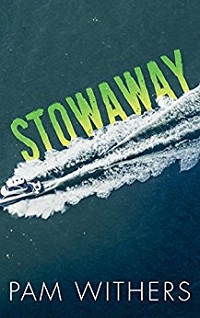| ________________
CM . . . . Volume XXIV Number 38. . . . June 1, 2018
excerpt:
Owen, 16, is home alone while his parents are away when a strange yacht takes refuge in his family’s marina in a storm. Unknown to Owen, Arturo, a Guatemalan street-kid turned sailor, is doing some slave labor on the yacht which is running illegal immigrants from Guatemala to Canada. When the storm blows over, Owen decides, as a lark, to stowaway on the yacht for a short trip to the nearest port. Once on board, however, it doesn’t take him long to realize the “school trip” he inadvertently interrupted could very quickly get him killed – especially when other complications ensue that ramp up the danger. Told in alternating chapters, Owen and Arturo take the reader on a fast-paced ride while providing very different perspectives of the choices that led both boys to their intersecting path. Owen comes from a solid middle class family, one that loves him and provides him everything he needs and more. Regardless of his comfortable upbringing, Owen and his brother got involved in a gang with disastrous results. Arturo, on the other hand, was leader of a small band of street kids in Guatemala trying to protect each other and stay alive. Both boys are haunted by events and choices in the past. And these choices shape the decisions they make during the novel. One would expect that the two boys would have distinct voices as they tell their respective chapters of the story. Unfortunately, this is not the case. Arturo’s voice includes a smattering of Spanish words and phrases, but the cadence of his speech and word choice do not reflect what the reader would expect from an uneducated, street-wise 16-year-old boy. Withers has woven effective backstories for the boys into the narrative of her novel, and these backstories bring all her characters to life. Even her cast of illegal immigrants are provided with enough history to make them individuals whose choices also reflect their fears. The boys being smuggled into Canada have families who love them and want to see them safe from gangs and other dangers common in their home country. Themes of trust, loyalty, and the power of the past are very evident in all the interactions that occur. Arturo wants a simple life away from the Captain who beats him. Owen also wants to leave the past behind and to work for the Coast Guard, but they will not take him if they know about his past gang involvement. The secrets Owen has kept about his brother are slowly revealed as he interacts with the hopeful boys who are trying to sneak into Canada. Withers has developed an ambitious plot with lots of twists and turns, including betrayals and evolving relationships. It should be noted that Stowaway has the feel of a cautionary tale, and the strong moral message is intertwined with the plot. Although some of the action seems contrived, Withers has provided her characters the motivation required to maintain plausibility. Stowaway has the patent happy ending. The good guys overcome their difficulties, face the consequences of their bad choices, and find a safe harbour. As Arturo declares, “Paradise, idiota.” Recommended. Jonine Bergen is a librarian in Winnipeg, MB.
Next Review |
Table of Contents for This Issue
- June 1, 2018. |
